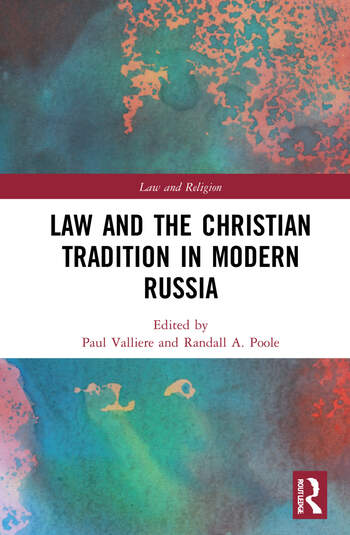
Law and the Christian Tradition in Modern Russia
edited by Paul Valliere and Randall A. Poole
This volume is part of a 50-volume series on “Great Christian Jurists in World History,” presenting the interaction of law and Christianity through the biographies of 1,000 legal figures of the past two millennia. Commissioned by the Center for the Study of Law and Religion at Emory University, each volume in this series focuses on a specific country, region, or era, and it samples the life and work of a score or more of its greatest legal minds over the centuries. These legal minds include not only civil and canon lawyers and judges but also theologians, philosophers, and church leaders who contributed decisively to legal ideas and institutions, or who helped create landmark statutes, canons, or cases. Thus, familiar Christian jurists like Gratian, Grotius, Blackstone, Kuttner, and Scalia appear in this series, but so do Augustine, Isidore, Aquinas, Calvin, Barth, Maritain, and Romero. This biographical approach is not intended to deprecate institutional, doctrinal, social, or intellectual histories of law, nor will it devolve into a new form of hagiography. It is instead designed to offer a simple method and common heuristic to study the interaction of law and Christianity around the world over the past two millennia.
Columbia University Press opened this series in 2006 with a three-volume work on Modern Christian Teachings on Law, Politics, and Human Nature, featuring thirty modern Catholic, Protestant, and Orthodox Christian figures. Cambridge University Press has new titles on great Christian jurists in the first millennium, as well as in English, Spanish, French, Lowlands, and American history. Routledge has taken up the Italian, Nordic, Russian, Welsh, and Latin American stories; Mohr Siebeck the German story; Federation Press the Australian story. Forthcoming titles will cover great Christian jurists in the history of Scotland, Ireland, Austria, Switzerland, Greece, Poland, and various countries and regions in Eastern Europe, central Eurasia, the Middle East, and parts of Africa and Asia.
Foreword by John Witte, Jr.
Twenty years ago, Paul Valliere published a pathbreaking volume, Modern Russian Theology: Orthodox Theology in a New Key. There he brought to brilliant light and life three great Russian Christian minds — Aleksandr Bukharev, Vladimir Soloviev, and Sergii Bulgakov — whose profound and original theological insights deserved much greater appreciation in the Christian West. Seven years later, Valliere led a team of experts in producing another hefty title, The Teachings of Modern Orthodox Christianity on Law, Politics, and Human Nature (2007), with lengthy case studies and translations of the theological jurisprudence of three Russian sages — Soloviev again, now joined by Nicholas Berdyaev and Vladimir Lossky — along with other Eastern Orthodox thinkers. These two pioneering volumes helped deepen English readers’ collective understanding of the hearts and minds of the Russian people and the distinct teachings and practices of Orthodox Christianity both in Russia and abroad. Valliere’s later superb monograph, Conciliarism: A History of Decision-Making in the Church (2012), added further depth and nuance to our understanding of the role of church councils in Eastern and Western churches historically and today.
In the past ten years, Randall Poole has published three signature collections on Russian philosophy and religion. A History of Russian Philosophy, 1830–1930: Faith, Reason, and the Defense of Human Dignity (2010), coedited with G. M. Hamburg, redirected attention away from the ideological precursors of Russian communism (emphasized by many older histories of Russian thought) to the Russian tradition of religious-philosophical humanism. The volume included careful analysis of a range of Russian arguments for human dignity, religious freedom, rule of law, and ordered liberty — ideas which placed Russia squarely within the broader European intellectual context. Poole’s Religious Freedom in Modern Russia (2018), coedited with Paul W. Werth, maintained the focus on human dignity but explored it in connection with the various meanings of religious freedom, toleration, and freedom of conscience in Russian history since the early modern period. Poole’s latest collection, The Oxford Handbook of Russian Religious Thought (2020), coedited with Caryl Emerson and George Pattison, is a landmark volume detailing the rich tapestry of religious ideas in Russian intellectual and cultural history.

In the present volume, Paul Valliere and Randall Poole have combined their talents and networks to create a brilliant new account of Law and the Christian Tradition in Modern Russia. The volume features fresh, crisp essays commissioned from a dozen leading experts from Russia, Europe, and North America. Two opening chapters offer a sweeping analysis of the complex interactions of church and state, theology and jurisprudence, canon law and civil law, Russian Orthodoxy and European thought over the past millennium. Thirteen exquisite case studies follow, focused on some of the most original and influential Russian jurists of the nineteenth and twentieth centuries, the period when formal jurisprudence finally came into full flower in Russia. Most of the names headlined in these chapters will be new to nonspecialist readers — Vasilii Malinovskii, Mikhail Speransky, Aleksandr Kunitsyn, Konstantin Pobedonostsev, Boris Chicherin, Anatolii Koni, Leonid Kamarovski, Vladimir Soloviev, Aleksei Pavlov, Pavel Novgorodtsev, Sergei Kotliarevskii, Nikolai Alekseev, and Ivan Ilyin. These are, however, the Russian equivalents of Western legal titans like Grotius, Blackstone, Beccaria, Story, Savigny, Gasparri, and Maritain, all of whose writings were known to their Russian legal contemporaries.
The authors of these chapters have made these earlier Russian jurists vividly present to us by translating their texts, terms, and ideas into accessible and authoritative forms for Anglophone readers. Most of these figures served as professors of law or philosophy, principally in Moscow. Several also worked as judges, diplomats, civil servants, church bureaucrats, legislative draftsmen, legal digesters and encyclopedists, practicing lawyers, and canonists. Some were conservative apologists for the political and ecclesiastical status quo; others were radical reformers who often suffered for their nonconformity. What this group held in common was a deep Orthodox sensibility and a profound interest in the religious dimensions of law, the legal dimensions of religion, and the interaction of legal and religious ideas, institutions, methods, and practices. Collectively, these jurists’ thought ranged widely across international laws of trade, war, and peace; Russian public, private, penal, and procedural law; Orthodox canon and ecclesiastical law; and administrative law, municipal law, and social justice reforms. Several of them offered creative natural law theories of sovereignty, constitutionalism, rule of law, human dignity, rights, equality, and liberty. Often they developed ingenious combinations of distinct Russian theological and philosophical tropes with Western liberal theories, as well as various forms of historical, sociological, and analytical jurisprudence.
This volume is the first such comprehensive history (in English) of law and Christianity in Russian history. I have dipped into Russian literature, history, theology, and law since college days, and was privileged to learn more from my mentor and colleague, Harold J. Berman, one of the greatest scholars of law and religion and of Russian and Soviet legal history. But I was astonished by how much new material on law and Christianity I found efficiently and expertly presented in these pages. This book can be read in a day but savored for a career.
This title is part of a multivolume series on Great Christian Jurists in World History, presenting the interaction of law and Christianity through the intellectual histories of a thousand legal figures of the past two millennia. It has been a joy for me to work with Professors Valliere and Poole and the wonderful group of scholars from Russia, Europe, and North America who contributed to this volume. I learned much from these experts and thank them for their sterling contributions. I was particularly touched to share memories with several contributors of our common mentor, Harold Berman, whose influence can be seen throughout these pages.♦

John Witte, Jr., JD (Harvard); Dr. Theol. h.c. (Heidelberg), is Robert W. Woodruff Professor of Law, McDonald Distinguished Professor of Religion, and director of the Center for the Study of Law and Religion at Emory University. A specialist in Legal History, Human Rights, Religious Freedom, Marriage and Family Law, Law and Religion, he has published 280 articles, 17 journal symposia, and 35 books.
Recommended Citation
Witte Jr., John. “‘Law and the Christian Tradition in Modern Russia’ Foreword by John Witte, Jr.” Canopy Forum, November 24, 2021. https://canopyforum.org/2021/11/24/law-and-the-christian-tradition-in-modern-russia.

